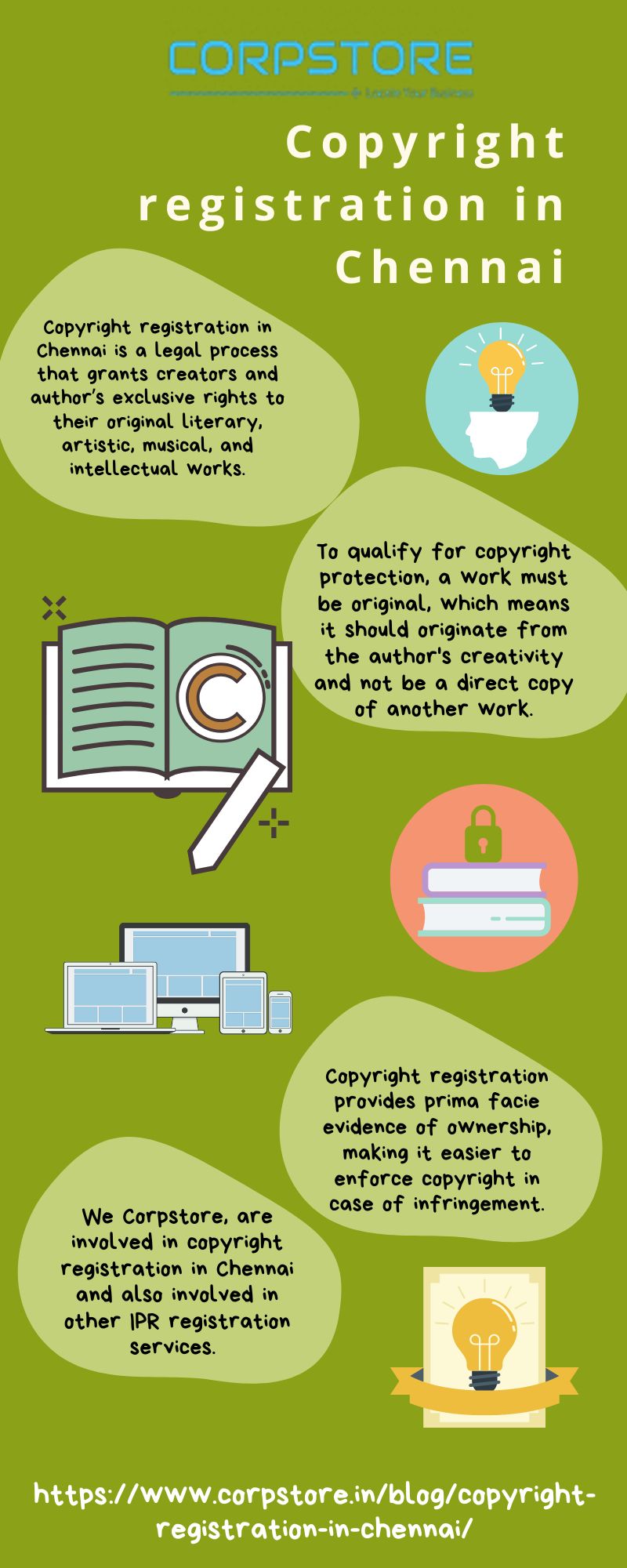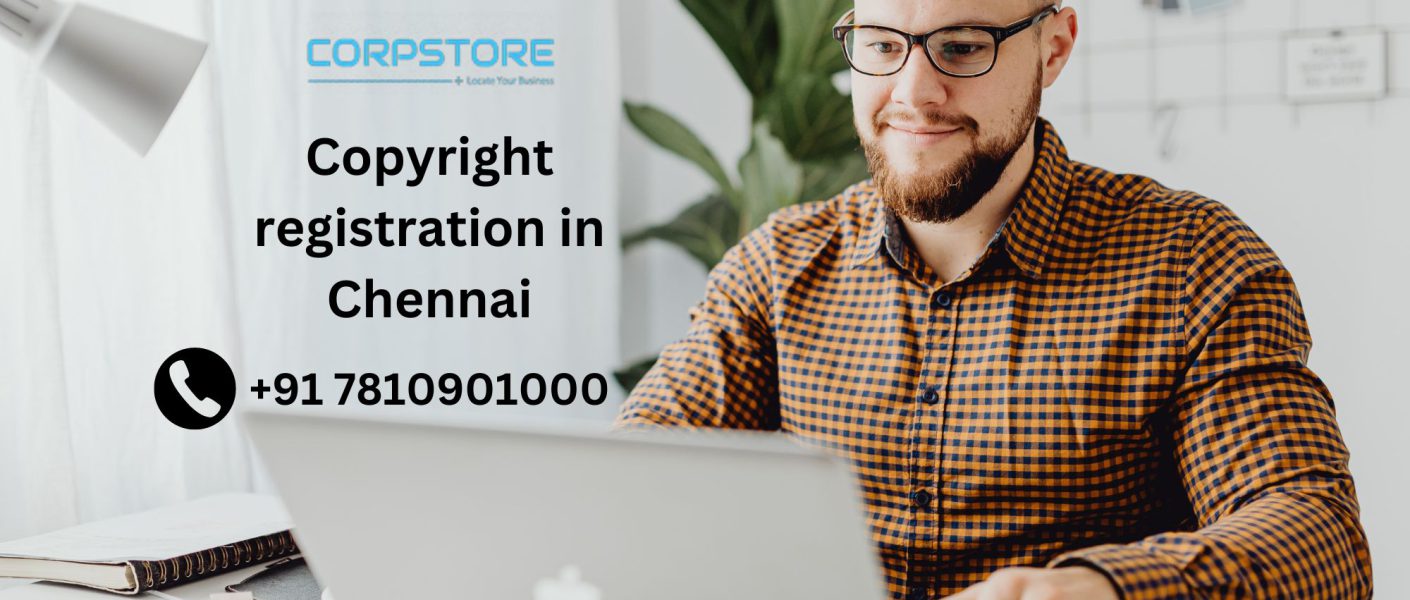Copyright registration in Chennai is a legal process that grants creators and author’s exclusive rights to their original literary, artistic, musical, and intellectual works. It provides protection against unauthorized reproduction, distribution, and adaptation of their creative works.
Copyright registration is governed by the Copyright Act, 1957, and is administered by the Copyright Office, a division of the Ministry of Education under the Government of India.
Here’s a detailed explanation of copyright registration in India:
Eligible Works:
Copyright registration in Chennai extends to a wide range of creative works, including literary works, dramatic works, musical compositions, artistic works, cinematographic films, sound recordings, and computer software. These categories cover books, plays, music, paintings, sculptures, films, software, and more.
Originality:
To qualify for copyright protection, a work must be original, which means it should originate from the author’s creativity and not be a direct copy of another work. It should also possess a sufficient degree of skill, labor, and judgment.
Ownership of Copyright:
Copyright initially belongs to the creator or author of the work. However, in cases of works created during employment, commissioned works, or works created by more than one author, the ownership may differ. It’s essential to clarify copyright ownership through contracts and agreements.
Duration of Protection:
In India, the duration of copyright registration in Chennai varies depending on the type of work. Generally, for literary, dramatic, musical, and artistic works, copyright lasts for the lifetime of the author plus 60 years. For anonymous works, posthumous works, cinematographic films, sound recordings, and government works, the duration varies.
Advantages of Copyright Registration:
Legal Protection:
Copyright registration provides prima facie evidence of ownership, making it easier to enforce copyright in case of infringement.
Exclusive Rights:
Copyright owners have the exclusive right to reproduce, distribute, adapt, perform, and display their work. They can license or transfer these rights to others.
Commercial Benefits:
Copyright registration in Chennai allows creators to monetize their works through licensing, sales, or royalties.
Global Protection:
India is a signatory to international copyright agreements, so copyright registration in India can provide protection in other countries that are party to these agreements.
Prevention of Infringement:
Registered copyright owners can take legal action against unauthorized use or reproduction of their work.
Thus, copyright registration in India is a valuable legal process that grants creators exclusive rights to their original works, protects their intellectual property, and allows them to benefit commercially from their creative endeavours.
It’s essential for authors, artists, and creators to understand the process of copyright registration in Chennai and take advantage of the protection it offers for their creative works.
Who is eligible for copyright filing?

Copyright filing eligibility is primarily determined by the type of creative work being protected rather than an individual’s personal qualifications or characteristics. In general, copyright law grants protection to original works of authorship fixed in a tangible medium of expression.
While copyright is an automatic right that arises upon the creation of a qualifying work, formal copyright registration is not mandatory. However, registration can provide additional legal benefits and protections. Here’s a detailed explanation of who is eligible for copyright filing:
- Authors and Creators:
The primary eligibility criterion for copyright protection is that an individual must be the author or creator of an original work. Authors and creators can include:
Writers: Authors of books, novels, articles, and other literary works.
Artists: Creators of visual arts, such as paintings, drawings, and sculptures.
Musicians: Composers, songwriters, and music producers.
Filmmakers: Directors, screenwriters, and producers of films and videos.
Programmers: Creators of computer software and code.
Photographers: Those who capture and create original photographs.
Choreographers: Creators of original dance routines.
Architects: Designers of original architectural works.
- Employees and Employers:
In some cases, employees who create works within the scope of their employment may not be the initial copyright holders; instead, the copyright may belong to their employers.
This is known as “work-for-hire” and is a significant exception to the general rule of authorship. In work-for-hire situations, the employer or hiring party is considered the author and is eligible for copyright registration in Chennai.
- Joint Creators:
When a work is created jointly by multiple authors, each author is typically considered a co-owner of the copyright and is individually eligible for copyright protection. Joint authorship can apply to collaborative efforts in various creative fields.
- Legal Entities:
Copyright protection can also extend to legal entities such as corporations, partnerships, and other organizations. These entities can be eligible for copyright protection if they are the creators or owners of copyrighted works.
- International Copyright:
Copyright protection is not limited to the citizens or residents of a specific country. Many countries, including India, grant copyright protection to works created by foreign nationals and entities, provided the work is eligible for protection under their national copyright laws.
- Duration of Copyright Eligibility:
Copyright protection lasts for the lifetime of the author plus an additional 60 years in India for literary, dramatic, musical, and artistic works. For anonymous, pseudonymous, and posthumous works, the duration may vary.
- Nationality or Residence:
Unlike some intellectual property rights, copyright eligibility does not depend on an individual’s nationality or place of residence. As long as the work qualifies for copyright protection, the author is eligible, regardless of their citizenship or location.
- Originality:
An essential requirement for copyright eligibility is that the work must be original. It should demonstrate a sufficient degree of creativity and originality, meaning it should not be a direct copy of another work. Even though copyright protects the expression of ideas and not ideas themselves, the expression must be independently created.
- Fixation:
To be eligible for copyright registration in Chennai, the work must be fixed in a tangible medium of expression. This means it must exist in a form that is perceptible either directly or with the aid of a machine or device. Examples of fixation include writing a story on paper, recording a song, or saving a digital file on a computer.
Conclusion
In conclusion, copyright filing eligibility is primarily based on the creation of original works of authorship, irrespective of the author’s nationality, residence, or personal characteristics.
As long as the work falls within the scope of eligible categories and meets the criteria of originality and fixation, the author or creator is eligible for copyright protection. Copyright law is designed to encourage and reward creative expression while promoting the dissemination of knowledge and culture.
We Corpstore, are involved in copyright registration in Chennai and also involved in other IPR registration services.





